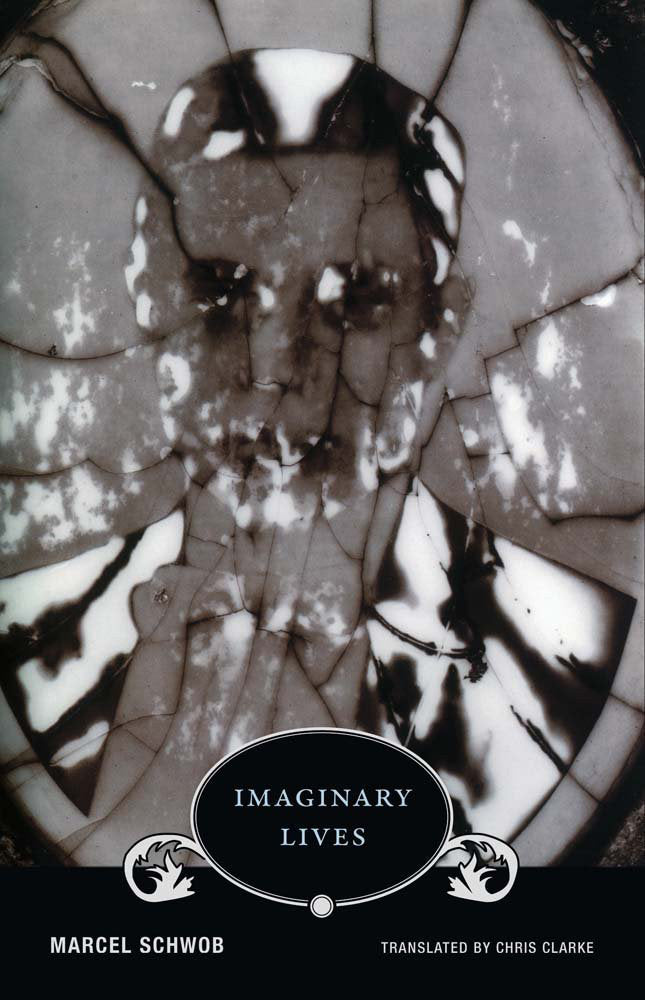Imaginary Lives
Imaginary Lives
Marcel Schwob
Couldn't load pickup availability
Translated, with an afterword, by Chris Clarke / May 2017 / 4.5 x 7, 176 pp. / 978-1-939663-34-4
“The art of the biographer consists specifically in choice. He is not meant to worry about speaking truth; he must create human characteristics amidst the chaos.”—Marcel Schwob
Imaginary Lives remains, over 120 years since its original publication in French, one of the secret keys to modern literature: under-recognized, yet a decisive influence on such writers as Guillaume Apollinaire, Jorge Luis Borges, Alfred Jarry, and Antonin Artaud, and more contemporary authors such as Roberto Bolaño and Jean Echenoz. Drawing from historical influences such as Plutarch and Diogenes Laërtius, and authors more contemporary to him such as Thomas de Quincy and Walter Pater, Schwob established the genre of fictional biography with this collection: a form of narrative that championed the specificity of the individual over the generality of history, and the memorable detail of a vice over the forgettable banality of a virtue.
These twenty-two portraits present figures drawn from the margins of history, from Empedocles the “Supposed God” and Clodia the “Licentious Matron” to the pirate Captain Kidd and the Scottish murderers Messrs. Burke and Hare. In his quest for unique existences, Schwob also formulated an early conception of the anti-hero, and discarded historical figures in favor of their shadows, be they divine, mediocre, or criminal. These “imaginary lives” thus acquaint us with the “Hateful Poet” Cecco Angiolieri instead of his lifelong rival, Dante Alighieri; the would-be romantic pirate Major Stede Bonnet instead of the infamous Blackbeard who would lead him to the gallows; the false confessor Nicolas Loyseleur rather than Joan of Arc, whom he cruelly deceived; or the actor Gabriel Spenser in place of the better-remembered Ben Jonson who ran a sword through his lung.
Winner of the 2019 French-American Foundation Translation Prize for Fiction
“A writer without compare.”—Guillaume Apollinaire
“An excellent artist.”—Léon Bloy
“Schwob: ‘He who knows.’”—Alfred Jarry
“All over the world there are devotees of Marcel Schwob that constitute small secret societies. He did not seek fame; he wrote deliberately for the ‘happy few.’”—Jorge Luis Borges
Marcel Schwob (1867–1905) was a scholar of startling breadth and an incomparable storyteller. A secret influence on generations of writers, from Guillaume Apollinaire and Jorge Luis Borges to Roberto Bolaño, Schwob was as versed in the street slang of medieval thieves as he was in the poetry of Walt Whitman. His allegiances were to Rabelais and François Villon, Robert Louis Stevenson and Edgar Allan Poe. Paul Valéry and Alfred Jarry both dedicated their first books to him, and in doing so paid tribute to the author who could evoke both the intellect of Leonardo da Vinci and the anarchy of Ubu Roi. He was also the uncle of Lucy Schwob, better remembered today as the Surrealist photographer Claude Cahun.
Press
“The book presents 22 short biographical tales written with impeccable narrative concision. Some feature an unknown figure from the margins of history (an African witch, a soldier for Charles VII ), others add fictional aspects to a famous life (Lucretius, Uccello, Pocahontas) and at least one imagines a historical life for a fictional character (Suffrah, the wizard from ‘Aladdin’).”
—Martin Riker, The Wall Street Journal
“There is pleasure in belonging to a secret society, I don’t deny. But it wouldn’t be a tragedy if this new translation introduced Schwob’s unparalleled book of lives to just a happy few more.”
—Alex Andiresse, The Quarterly Conversation
“Never have the losers of history been rendered with such care and wit.”
—Scott Beauchamp, The American Conservative


